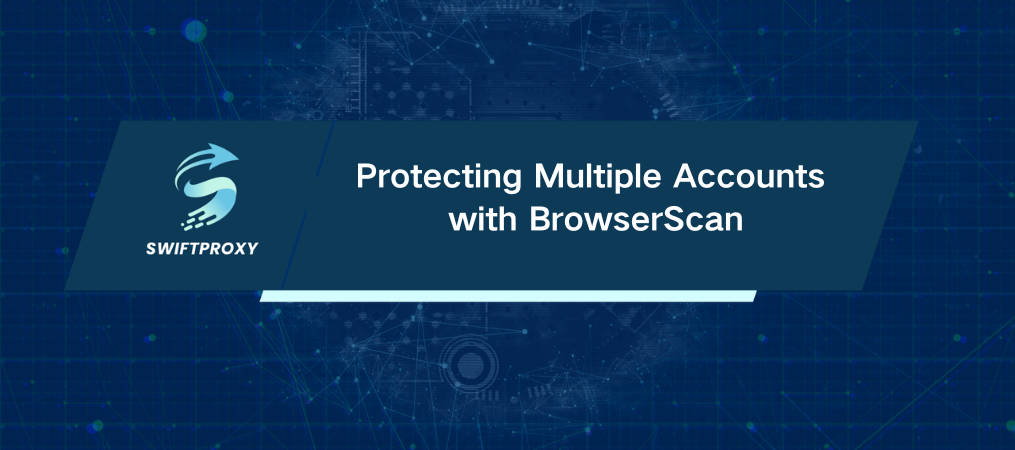Protecting Multiple Accounts with BrowserScan

Multi-accounting has become a go-to strategy for businesses across industries. Whether it's e-commerce, social media marketing, or affiliate advertising, the ability to operate multiple accounts offers clear benefits—more exposure, more opportunities, and better marketing results. But there's a significant, often overlooked risk that could sabotage your efforts: browser fingerprints.
Every time you interact with a website, your browser sends a unique set of data known as a browser fingerprint. This includes everything from your device's specifications to your browsing habits. The problem? If you're using the same device and browser for multiple accounts, these fingerprints become identical. And that can get you flagged as engaging in fraudulent activity, leading to account bans or restrictions.
Let's break it down. If you run multiple seller accounts on an e-commerce platform to boost your visibility or sales, and these accounts share the same browser fingerprint, the platform might flag them as spam. The same applies on social media or other marketing platforms: identical fingerprints across accounts can lead to them being marked as fraudulent.
But don't worry. There are ways to safeguard your operations from the hidden dangers of browser fingerprints.
The Limits of Anti-Detect Browsers
Many turn to anti-detect browsers to mask their real device details. While these tools can help, they're not foolproof. Here's the catch: improper configuration or the inherent flaws in some fingerprint browsers can still leak personal information, or worse, create fingerprints that seem suspicious. This could trigger alerts on platforms, linking multiple accounts together.
The key to successful multi-accounting isn't just using an anti-detect browser—it's actively verifying that your fingerprint remains undetectable. That's where BrowserScan comes in.
How to Detect Your Browser Fingerprints Using BrowserScan
BrowserScan is an invaluable tool for testing and fine-tuning your digital footprint. Here's how it works and why you should use it.
Step 1: Access BrowserScan
Visit browserscan using any browser—whether it's your regular one or an anti-detect browser. The tool will analyze your browser fingerprint and provide a detailed report in just seconds.
Step 2: Analyze the Fingerprint Report
The report will cover several key elements:
IP Address: This tells you the location of your device, which could expose your true identity if you're using the same IP across multiple accounts. BrowserScan uses WebRTC to detect any leaks of your actual IP. If it's leaking, you'll know.
Location: You'll see the country, city, postal code, and latitude/longitude of your IP address. If your IP shows up in the U.S., but your actual location is in Singapore, it's a red flag.
Browser and OS Details: This section provides details about the browser you're using, including the version number, operating system, and user-agent information. Misalignment between these details and the hardware info can lead to suspicion.
Hardware Fingerprint: BrowserScan checks your device's hardware, like the GPU, CPU, screen resolution, and more. If your fingerprint browser doesn't match the actual hardware of your device (say you're using a Mac, but your GPU doesn't align), platforms might see that as a sign of manipulation.
Software Info: Check your time zone, local time, and language settings. If you're operating in the U.S. but your browser thinks it's in a different time zone, that's another clue that something's off.
Step 3: Look for Leaks
If the authenticity of your fingerprint is less than 90%, you need to dig deeper. This is where WebRTC leaks come into play. WebRTC can expose your real IP, even when using a proxy or VPN. BrowserScan will tell you if your real IP has leaked during the check, which could make your multi-account setup vulnerable.
Step 4: Compare Multiple Accounts
If you're managing several accounts, you can use BrowserScan to check if their fingerprints match. Multiple accounts sharing the same fingerprint could lead to them being flagged as linked. It's best to check each account's fingerprint to ensure there's no overlap.
Advanced Tools
BrowserScan doesn't just stop at fingerprints. Here are two more features you'll find useful:
IP Check: This tool allows you to see ownership information for any given IP address. It checks across seven different IP databases, helping you spot discrepancies in your IP usage. If you're using a proxy IP and it shows up with conflicting ownership details, you might want to change it before continuing to use it for multiple accounts.
Cookie Analyzer: BrowserScan supports converting cookies from Netscape format to JSON, helping you verify that no crucial information is missing from the cookies associated with your accounts.
Why BrowserScan Is Essential for Multi-Account Security
BrowserScan is more than just a detection tool—it's your browser fingerprint health checkup. By regularly testing your setup, you ensure that your multi-account activities remain safe and undetectable. This is vital for protecting your digital footprint, especially if you're using anti-detect browsers like AdsPower, MultiLogin, or GoLogin.
If BrowserScan flags any abnormalities in your fingerprint or browser settings, you can adjust your setup to keep everything looking as natural as possible. The fewer anomalies, the less chance of being caught.
Conclusion
Browser fingerprints are a real risk when managing multiple accounts. Whether you're running e-commerce stores, handling marketing campaigns, or promoting content across platforms, it's crucial to keep your fingerprints in check. With BrowserScan, you can ensure that your digital footprint remains clean, making your accounts more secure and your operations smoother.
Regularly testing your browser fingerprint and addressing any issues can save you from account bans, fraud detection, or worse. It's not just about masking your fingerprint—it's about ensuring your setup is flawless. So, next time you're managing multiple accounts, take a minute to run a BrowserScan. It's a small investment in peace of mind.

















































